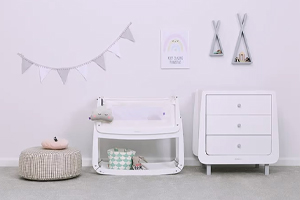How to Sleep Better During Pregnancy: 10 Tips for Tired Mum-to-Be’s
If you need some tips on how to sleep better during pregnancy, we’re here to help put your mind to rest.
Getting enough Z’s is crucial for both you and your growing baby. Not only does sleep help you feel more energised, but it also supports your immune system and helps with foetal development.
We know that finding comfortable sleeping positions can be difficult with your bump, but it’s certainly not impossible.

10 Tips for Getting Proper Sleep During Pregnancy
The reasons for your sleep struggles will be different depending on your situation and your pregnancy, but there are some common ways you can help improve your quality of sleep no matter what's causing the issue.
Here are our top 10 tips for getting a good night's sleep throughout your pregnancy.
- Create a Consistent Bedtime Routine
- Plan Your Food & Drink Consumption
- Use a Pregnancy Pillow for Side Sleeping
- Tackle the Heartburn
- Don't Be Afraid to Ask for Help
- Get Some Fresh Air & Exercise
- Keep Your Breathing Healthy
- Pamper Your Legs
- Get Out of Bed
- When in Doubt, Ask Your Doctor


1. Create a Consistent Bedtime Routine
Establishing a consistent bedtime routine is the key to significantly improving sleep during pregnancy. By signalling to your body that it's time to wind down and prepare for rest, you can significantly improve your sleep.
Having a routine helps regulate your body's internal clock, leading to more predictable sleep patterns.
Activities like reading, gentle stretching, or listening to calming music can be part of this routine. These promote relaxation and make it easier to fall and stay asleep, which is especially beneficial as your body undergoes changes.

2. Plan Your Food & Drink Consumption
Timing your food and drink consumption is crucial for improving sleep quality during pregnancy. Eating smaller, more frequent meals rather than large ones can reduce the likelihood of reflux, a common issue that can disrupt sleep.
But don’t forget you’re eating for two! Make sure to nourish your body with healthy, nutritious foods that will support you and your growing baby, like iron, calcium, and vitamin D.
Similarly, moderating your fluid intake, especially in the evening, can help decrease the frequency of nighttime urination. These adjustments can help you feel more comfortable and reduce sleep interruptions, allowing you a more restful night.
Read The Modern Midwife’s Guide to Prenatal Health


3. Use a Pregnancy Pillow for Side Sleeping
A pregnancy pillow supports your changing body, providing relief to your hips, back, and stomach. Designed for side sleeping – which is recommended during pregnancy for safety and comfort – it helps maintain a healthy spinal alignment.
This tailored support reduces discomfort and frequent waking, leading to a deeper, more restorative sleep. Investing in a pregnancy pillow can be a game-changer for enhancing sleep quality throughout your pregnancy.
The SnüzCurve Pregnancy Support Pillow is the ultimate pregnancy pillow, keeping you and your bump supported through the night. Its unique KneeBlade design keeps your spine in neutral alignment throughout the night, alleviating back pain.
We've developed this leading pregnancy pillow with healthcare professionals so it provides the best support for your changing body through all stages of your pregnancy.

4. Tackle the Heartburn
Alleviating heartburn is vital for a good night's sleep, as it prevents painful discomfort that can keep you awake or even disrupt your sleep.
To combat heartburn during pregnancy, avoid spicy and acidic foods before bedtime, eat smaller meals to reduce stomach pressure, and keep your head elevated while sleeping to prevent acid reflux.

5. Don't Be Afraid to Ask for Help
It's completely normal to ask for help with your older children during pregnancy. Many expectant mothers find themselves overwhelmed and exhausted trying to balance the demands of pregnancy with the needs of their other children.
Seeking support from your partner, family members, or friends to help with childcare can significantly reduce your stress levels and allow you to rest more and sleep better.
Remember, taking care of yourself and ensuring you get enough sleep is not just for your benefit but also for the well-being of your growing baby and your family.

6. Get Some Fresh Air & Exercise
Regularly stepping outside for fresh air and engaging in gentle exercise can significantly impact sleep quality during pregnancy.
Fresh air not only revitalises your senses and increases oxygen levels in your body, but it also promotes a feeling of well-being, helping to reduce stress and anxiety, which can often interfere with sleep.
It's important to consult with your healthcare provider before starting any new exercise regime during pregnancy to ensure it's safe for you and your baby.


7. Keep Your Breathing Healthy
Monitoring your breathing patterns is crucial during pregnancy, especially at night. Hormonal changes and the growing uterus can influence your respiratory system, occasionally leading to snoring or sleep apnea.
These conditions not only disrupt your sleep but may also affect your baby's oxygen supply. Engaging in breathing exercises before bed can improve your oxygen flow and support a restful night.
This small adjustment can significantly enhance both the quality of your sleep and your overall respiratory health during pregnancy.

8. Pamper Your Legs
Pampering your legs before bed can be crucial in avoiding Restless Leg Syndrome (RLS) and improving overall sleep quality during pregnancy.
RLS is a common condition experienced by expectant mothers, characterised by the irresistible urge to move the legs. This sensation can severely disrupt sleep, making it difficult to both fall asleep and stay asleep.
By incorporating simple leg care routines such as gentle leg massages, warm baths, or warm compresses, you can alleviate the symptoms of RLS.
These practices help relax the leg muscles and improve blood circulation, significantly reducing the discomfort and frequency of RLS episodes.

9. Get Out of Bed
If, despite trying multiple approaches to encourage sleep, you find yourself wide awake, it might be helpful to get out of bed for a while.
Staying in bed while struggling to sleep can lead to frustration and make relaxation even harder to achieve. Instead, consider leaving your bedroom and engaging in a quiet, calming activity, such as reading under soft lighting or practising some gentle, meditative stretches.
These activities can help shift your focus from the anxiety of not sleeping to a state of relaxation, making it easier to feel sleepy again. Once you feel drowsy, return to bed and try to sleep.
This method helps reset your body and mind, improving your chances of falling asleep more quickly.


10. When in Doubt, Ask Your Doctor
If you're experiencing persistent issues with sleeping during your pregnancy and have attempted various strategies without success, it's crucial to contact your doctor or midwife.
Sleep disturbances can sometimes indicate underlying health concerns that require professional attention.
Your healthcare provider can offer tailored advice based on your specific situation and, if necessary, refer you to a sleep specialist who has experience dealing with pregnancy-related sleep problems.
Remember: prioritising your sleep is beneficial for your well-being and essential for the health and development of your baby. Don't hesitate to seek help if you're struggling to get the rest you need.

Do Sleep Aids Help You Sleep in Pregnancy?
While some sleep aids may be safe during pregnancy, you shouldn't take anything new without consulting with your healthcare provider. Your doctor can recommend safe options tailored to your specific needs.
While there's a general attitude that natural remedies and lifestyle adjustments are preferred to pharmacological solutions to avoid potential risks to the foetus, safety and well-being for both you and your baby should always come first when considering sleep aids during pregnancy.

What Are the Side Effects of Broken Sleep in Pregnancy?
Experiencing broken sleep during pregnancy can have multiple side effects that may affect both the mum's and baby's health.
The most common impacts include increased stress levels, heightened irritability, and a decrease in immune function, which can make pregnant women more susceptible to infections and illnesses.
Poor sleep quality can also contribute to gestational complications such as elevated blood pressure and increased risk of gestational diabetes. It can also lead to prolonged labour and a higher likelihood of requiring a caesarean section.
Read more advice from The Modern Midwife on how much sleep you need during pregnancy

Summary: How to Sleep Well During Pregnancy
Sleep challenges during pregnancy are a common yet manageable aspect of this special time. By integrating our top 10 tips, you can significantly enhance your sleep quality.
Remember, prioritising rest is not only crucial for your well-being but also plays a vital role in your baby's health and development.
To find out more about staying healthy during pregnancy, read The Modern Midwife's Guide to Prenatal Health on our Sleep Centre.
FAQs
Sleepless nights during pregnancy can be caused by a blend of hormonal fluctuations, physical discomforts like back pain and frequent urination, emotional stress related to impending parenthood, and excitement about the baby's arrival, all of which can significantly disrupt normal sleep patterns.
Lack of sleep does not directly harm the foetus but can indirectly affect foetal health by increasing maternal stress, which may impact foetal development. Ensuring a mother's good sleep quality is essential for optimal prenatal care and reducing stress levels for both mother and baby.
Waking up at 3 AM during pregnancy is often due to hormonal changes, physical discomfort, or the need to urinate. These factors disrupt the sleep cycle, making it common for expectant mothers to experience interrupted sleep patterns. Waking up at the same time in the night might be due to when you're eating and drinking before bed.
It is generally advised to avoid lying on your back for extended periods during the second and third trimesters of pregnancy. This position can restrict blood flow to your baby.
However, lying on your back for short durations, such as an hour, is usually considered safe. Always consult with your healthcare provider.



























